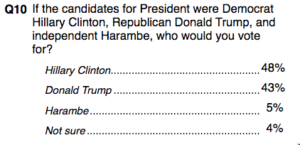Lucifer, Harambe, and Agrabah
Public Policy Polling has a history of asking … unusual… questions in their political polls. For example, asking if you are in favour of bombing Agrabah (the fictional country of Disney’s Aladdin), whether you think Hillary Clinton has ties to Lucifer, and whether you would vote for Harambe (the dead, 17-yr old gorilla) if running as an independent against Trump and Clinton.
From these three questions, the Lucifer one stands out: it comes from a familiar news issue and isn’t based on tricking the respondents. People may not answer honestly, but at least they know roughly what they are being asked and how it’s likely to be understood. Since they know what they are being asked, it’s possible to interpret the responses in a reasonably straightforward way.
Now, it’s fairly common when asking people (especially teenagers) about drug use to include some non-existent drugs for an estimate of the false-positive response rate. It’s still pretty clear how to interpret the results: if the name is chosen well, no respondents will have a good-faith belief that they have taken a drug with that name, but they also won’t be confident that it’s a ringer. You’re not aiming to trick honest respondents; you’re aiming to detect those that aren’t answering honestly.
The Agrabah question is different. There had been extensive media discussion of the question of bombing various ISIS strongholds (eg Raqqa), and this was the only live political question about bombing in the Middle East. Given the context of a serious opinion poll, it would be easy to have a good-faith belief that ‘Agrabah’ was the name of one of these ISIS strongholds and thus to think you were being asked whether bombing ISIS there was a good idea. Because of this potential confusion, we can’t tell what the respondents actually meant — we can be sure they didn’t support bombing a fictional city, but we can’t tell to what extent they were recklessly supporting arbitrary Middle-Eastern bombing versus just being successfully trolled. Because we don’t know what respondents really meant, the results aren’t very useful.
The Harambe question is different again. Harambe is under the age limit for President, from the wrong species, and dead, so what could it even mean for him to be a candidate? The charitable view might be that Harambe’s 5% should be subtracted from the 8-9% who say they will vote for real, living, human candidates other than Trump and Clinton. On the other hand, that interpretation relies on people not recognising Harambe’s name — on almost everyone not recognising the name, given that we’re talking about 5% of responses. I can see the attraction of using a control question rather than a half-arsed correction based on historical trends. I just don’t believe the assumptions you’d need for it to work.
Overall, you don’t have to be very cynical to suspect the publicity angle might have some effect on their question choice.


